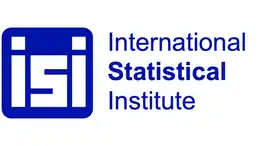Institut international de statistique
L'institut international de statistique (IIS, sigle anglais ISI) fut fondé en 1885 lors d'un congrès de la Royal Statistical Society. Comme elle, elle réunit lors de congrès annuels les statisticiens du monde entier, mais à la différence de celle-ci, est indépendante de tout gouvernement. Ses congrès ont pour but de fixer des principes communs à tous les pays[1].
Institut international de statistique

(en) Statistical Science for a Better World |
| Fondation |
|---|
| Sigles |
(en) ISI, IIS |
|---|---|
| Type | |
| Domaines d'activité | |
| Siège |
Leidschenveen (312, Henri Faasdreef, 2492 JP, Pays-Bas) |
| Pays |
| Site web |
(en) www.isi-web.org |
|---|
Organisation
L'Institut est une organisation faîtière qui regroupe sept sous-organisations[2] :
| Abréviation | Nom | depuis |
|---|---|---|
| BS | Bernouilli Society for Mathematical Statistics and Probability | 1975 |
| IAOS | International Association for Official Statistics | 1985 |
| IASC | International Association for Statistical Computing | 1977 |
| IASE | International Association for Statistical Education | 1991 |
| IASS | International Association of Survey Statisticians | 1973 |
| ISBIS | International Society for Business and Industrial Statistics | 2005 |
| TIES | The International Environmetrics Society | 2008 |
Présidents de l'IIS
Les présidents de l'Institut sont[3] :
- 1885 - 1899 Sir Rawson W. Rawson
- 1899 - 1908 Karl von Inama-Sternegg
- 1909 - 1920 Luigi Bodio
- 1923 - 1931 Albert Delatour
- 1931 - 1936 Friedrich Zahn
- 1936 - 1947 Armand Julin
- 1947 - 1947 Walter F. Willcox
- 1947 - 1953 Stuart A. Rice
- 1953 - 1960 Georges Darmois
- 1960 - 1963 Marcello Boldrini
- 1963 - 1967 Sir Harry Campion
- 1967 - 1971 William G. Cochran
Mandats de deux ans :
- 1971 - 1975 Petter Jakob Bjerve
- 1975 - 1977 Milos Macura
- 1977 - 1979 Calyampudi Radhakrishna Rao
- 1979 - 1981 Edmond Malinvaud
- 1981 - 1983 Enrique Cansado
- 1983 - 1985 James Durbin
- 1985 - 1987 Sigeiti Moriguti
- 1987 - 1989 Ivan P. Fellegi
- 1989 - 1991 Gunnar Kulldorff
- 1991 - 1993 Frederick Mosteller
- 1993 - 1995 Jayanta K. Ghosh
- 1995 - 1997 Sir David R. Cox
- 1997 - 1999 Willem van Zwet
- 1999 - 2001 Jean-Louis Bodin
- 2001 - 2003 Dennis Trewin
- 2003 - 2005 Stephen Stigler
- 2005 - 2007 Niels Keiding
- 2007 - 2009 Denise A. Lievesley
- 2009 - 2011 Jef L. Teugels
- 2011 - 2013 Jae Chang Lee
- 2013 - 2015 Vijayan N. Nair
Périodiques
L'Institut édite sept périodiques :
Prix et distinctions
L'Institut décerne les prix suivants :
- Prix international de statistiques
- Médaille Henri Willem Methorst
- Prix Karl-Pearson
- Prix Jan-Tinbergen[7]
- Prix Mahalanobis[8]
Notes et références
- Gabriel Chevry, L'Institut international de statistique (IIS), Économie et statistique, année 1970 vol. 13.
- « ISI Associations ».
- (en) ISI Presidents.
- « International Statistical Review » sur Zentralblatt MATH.
- « Bernoulli - Official Journal of the Bernoulli Society for Mathematical Statistics and Probability » sur Zentralblatt MATH.
- « Computational Statistics and Data Analysis » sur Zentralblatt MATH.
- Jan Tinbergen Awards For Young Statisticians
- The Mahalanobis International Award for a Statistician from a Developing Country.
Cet article est issu de wikipedia. Text licence: CC BY-SA 4.0, Des conditions supplémentaires peuvent s’appliquer aux fichiers multimédias.